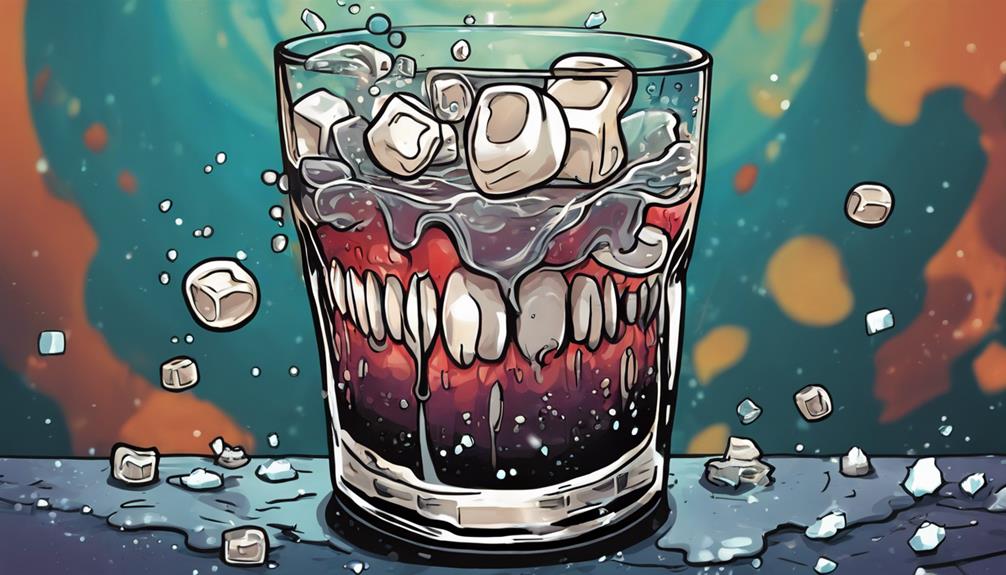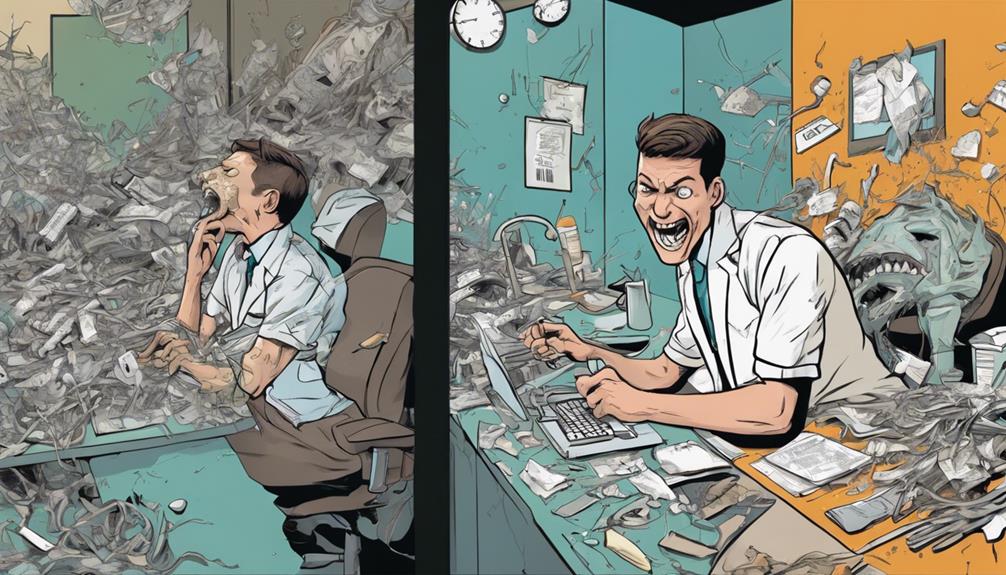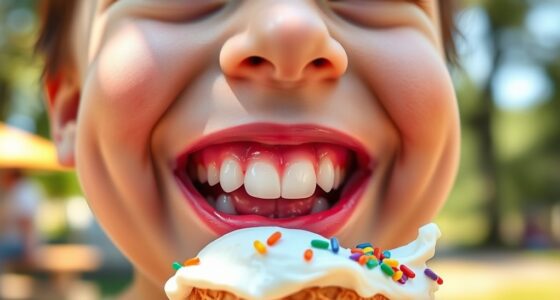You need to stop drinking soda for your teeth because it exposes them to harmful acids and sugars that cause decay and erosion. Each sip introduces acids that weaken enamel, making you more susceptible to cavities and sensitivity. Even diet sodas are acidic and pose risks to your dental health. Regular soda consumption can lead to bad breath, toothaches, and even tooth loss. By reducing your soda intake, you can greatly protect your teeth and smile. There are simple strategies you can implement to maintain a healthier mouth, and there's more to discover about making better choices for your dental health. That’s especially important for children, whose dental health can be more significantly affected by soda consumption. The high sugar content in soda can lead to tooth decay in kids, and their still-developing enamel is even more vulnerable to erosion from the acids. That’s why soda harms kids’ teeth, and it’s crucial for parents to limit their children’s intake of these damaging beverages for their overall dental well-being.
Key Takeaways
- Soda's high sugar content feeds harmful bacteria, producing acids that erode tooth enamel and increase cavity risk.
- The acidity of both regular and diet sodas continuously damages teeth, exposing them to decay and sensitivity.
- Acid exposure from soda can linger in the mouth for up to 30 minutes, compounding the risk of dental issues.
- Regular soda consumption correlates with symptoms like bad breath, toothaches, and potential tooth loss over time.
Soda and Tooth Decay
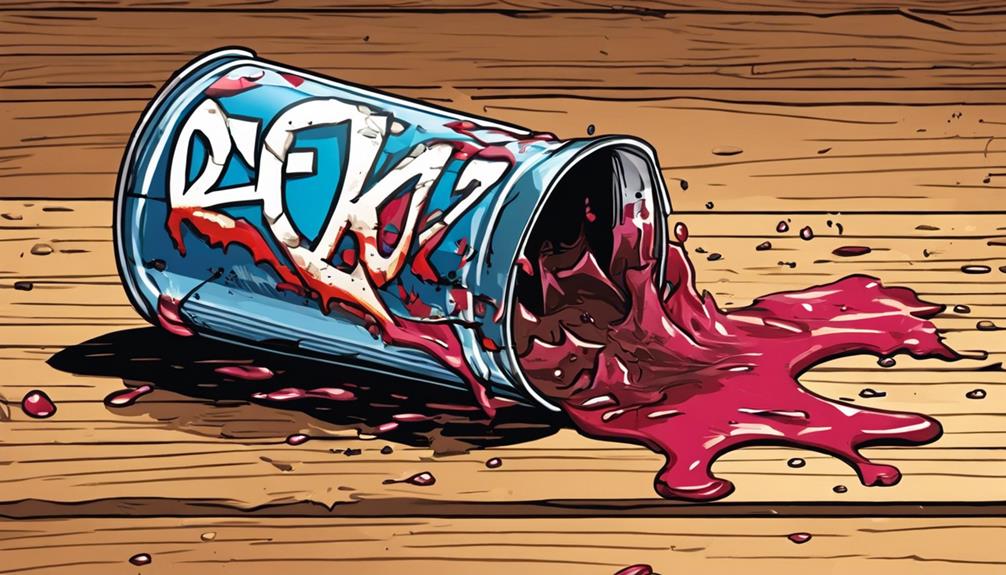
Soda can wreak havoc on your teeth, leading to tooth decay and serious dental issues. The high sugar levels in soda interact with bacteria in your mouth, producing acids that attack your tooth enamel. You mightn't realize that these acid attacks can continue for up to 20 minutes after you finish your drink, continuously compromising your teeth.
Whether you're sipping on regular or diet soda, both can contribute to tooth decay. While diet sodas lack sugar, they still contain acids that erode enamel, making your teeth vulnerable. Regular consumption of soda increases the risk of dental erosion, which can result in severe damage if you don't address it promptly.
Chronic exposure to the sugars and acids found in soda can lead to troubling symptoms such as bad breath, toothaches, and eventually, tooth loss if left untreated.
To protect your smile and maintain healthy teeth, it's essential to limit your soda intake. By doing so, you'll not only preserve your enamel but also avoid the painful consequences of tooth decay. Prioritize your dental health and consider cutting back on soda for a brighter, healthier future.
The Role of Acids
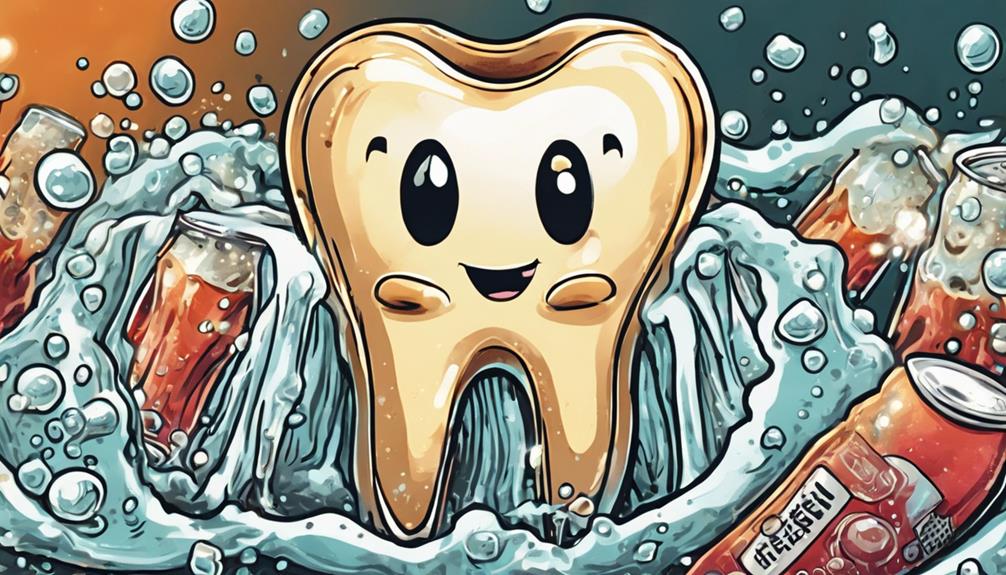
When you enjoy a soda, you're not just indulging in sweetness; you're also exposing your teeth to harmful acids.
These acids can erode your enamel and keep attacking for up to 30 minutes after you take a sip.
Understanding how this acid production works and its effects on your dental health is essential for making better choices.
Acid Production Mechanism
The acids produced from sugar interacting with bacteria in your mouth can seriously erode tooth enamel and lead to cavities. When you consume soda, the sugar content mixes with the bacteria in your saliva, triggering acid production. This process starts almost immediately, and the acids can attack your tooth enamel for about 20 minutes after you've finished drinking.
Moreover, the carbonation in soda adds another level of acidity, further exacerbating enamel erosion. Each sip of soda not only introduces sugar but also initiates a cycle of acid production. Over time, this repeated exposure weakens your teeth, making them more vulnerable to decay and increasing sensitivity.
Even diet sodas, which replace sugar with artificial sweeteners, can still contribute to acid attacks. Regular consumption of these beverages poses a significant threat to your overall dental health.
To protect your teeth, it's essential to be aware of how sugar and acid interact in your mouth. The more you understand the acid production mechanism, the better equipped you'll be to make choices that safeguard your enamel and maintain your smile.
Enamel Erosion Effects
Harmful acids from soda can greatly weaken your tooth enamel, leading to increased sensitivity and a higher risk of cavities. Each time you sip on a soda, you're subjecting your teeth to acid attacks that can initiate enamel erosion. Both regular and diet sodas are highly acidic, which means they can lower the pH in your mouth and create an environment where decay thrives.
The repeated exposure to these acids can considerably compromise your tooth structure over time. As your enamel erodes, your teeth become more susceptible to damage and decay, making proper oral hygiene even more essential. You might notice that sweet treats and cold beverages start to cause discomfort due to heightened sensitivity, a direct result of weakened enamel.
To combat the effects of enamel erosion, consider reducing your soda intake and employing protective measures. Rinsing your mouth with water after consuming soda can help neutralize harmful acids, giving your enamel a fighting chance.
Duration of Acid Exposure
Acids from soda can linger in your mouth for about 20 to 30 minutes after you've taken a sip, continuously attacking your tooth enamel during that time. This prolonged acid exposure can weaken your teeth, making them more susceptible to cavities and sensitivity. Each sip of soda not only adds immediate acid but also encourages bacteria to produce even more harmful acids.
| Effect on Teeth | Consequences |
|---|---|
| Weakens Tooth Enamel | Increased Cavities |
| Exacerbates Erosion | Tooth Sensitivity |
| Compromises Tooth Integrity | Long-term Damage |
| Encourages Bacteria Growth | More Acid Attacks |
The cumulative effect of repeated acid exposure from soda can lead to serious dental issues. Over time, your enamel thins, making your teeth prone to decay and discomfort. Limiting your soda intake is essential for maintaining ideal dental health. Remember, every time you reach for that can, you're inviting a battle against your tooth enamel. Make informed choices for a healthier smile!
Consequences of Enamel Erosion
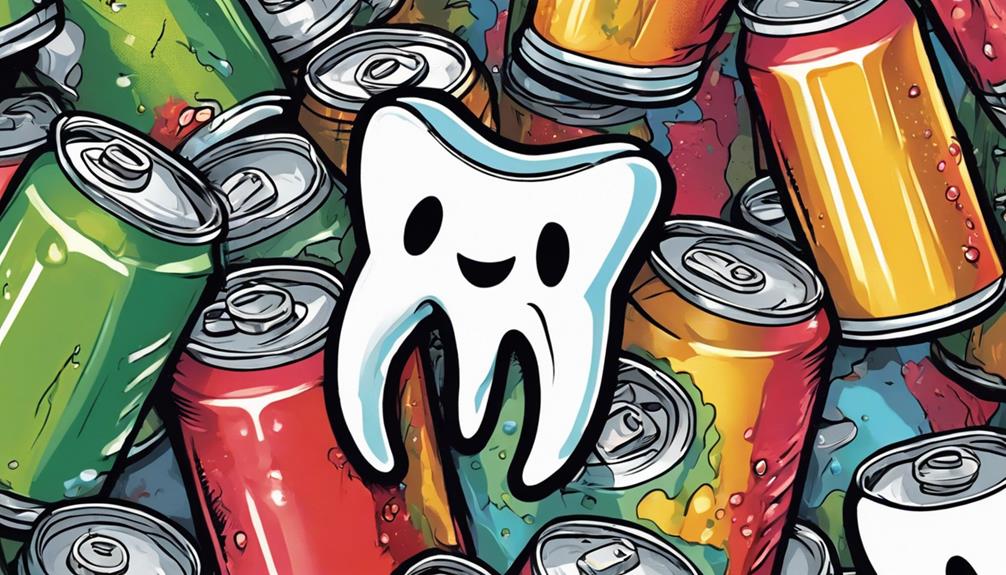
Enamel erosion can lead to increased sensitivity and a higher risk of cavities, making it essential to limit soda intake for better dental health.
When you consume soda, the acid exposure can weaken your tooth enamel, causing it to wear away over time. This erosion makes your teeth more vulnerable to decay and painful sensations. You might notice that hot, cold, or sweet foods cause discomfort, a direct result of enamel erosion.
Both regular and diet sodas are culprits in this process. The high acidity of these beverages attacks your enamel for 20 to 30 minutes after each sip, continuously compromising your dental health. Dark-colored sodas are especially harmful, as they not only contribute to enamel erosion but also lead to tooth discoloration and staining.
Once your enamel is eroded, it won't regenerate, which is why prevention is key. Reducing your soda consumption can greatly help protect your teeth from the irreversible damage caused by enamel erosion.
You owe it to yourself to prioritize your dental health by cutting back on these acidic drinks and opting for healthier alternatives.
Health Risks From Soda
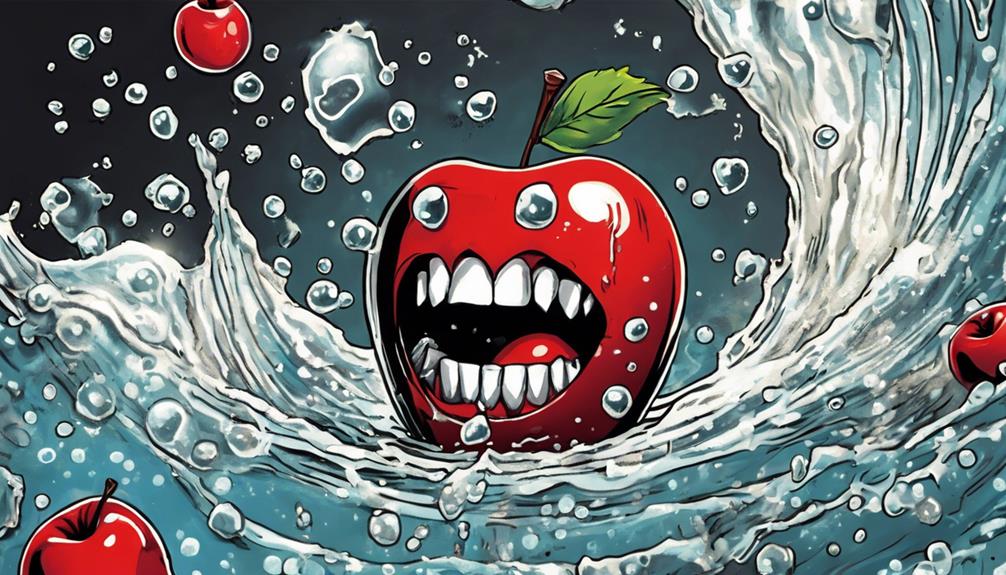
When you drink soda, you're not just enjoying a sweet treat; you're also increasing your risk of cavities and tooth decay.
The sugars and acids in soda create a perfect environment for harmful bacteria to thrive, leading to serious dental issues.
Plus, the acid in these drinks can erode your tooth enamel, making it essential to understand the health risks involved.
Cavities and Tooth Decay
Sipping on soda not only satisfies your thirst but also sets the stage for cavities and tooth decay due to its high sugar content. When you drink soda, the sugar interacts with bacteria in your mouth, leading to the production of harmful acids. These acids attack your teeth, causing enamel erosion and increasing your risk of cavities. The effects of these acid attacks can linger for up to 20 minutes after you finish your drink, continuously compromising your tooth integrity.
Regularly consuming soda makes your teeth more susceptible to decay and cavities. You may start noticing symptoms like bad breath or toothaches, which are signs of ongoing damage. Ignoring these symptoms can lead to more severe dental complications down the line, making it vital to address the issue sooner rather than later.
To safeguard your oral health, consider reducing or eliminating soda from your diet. Regular dental check-ups are also essential for monitoring the effects of soda on your teeth. Remember, by cutting back on soda, you're not just quenching your thirst; you're actively protecting your teeth from decay and cavities.
Bacterial Growth Risks
Drinking soda not only feeds your thirst but also creates an ideal environment for harmful bacteria to thrive in your mouth. The high sugar content in soda fuels this bacterial growth, leading to acid attacks that can last for up to 20 minutes after you finish your drink. These acids are responsible for tooth decay and cavities, greatly increasing your risk of dental damage.
Regularly consuming soda can worsen your dental hygiene, which exacerbates bacterial growth. This cycle can contribute to gum disease and other oral health issues, making it essential to understand the consequences of your beverage choices. The harmful bacteria that thrive on sugars from soda produce acids that slowly erode your tooth enamel, leaving your teeth more susceptible to decay and sensitivity.
Studies show that chronic exposure to sugary beverages correlates with a higher prevalence of dental cavities. If you want to protect your smile, consider cutting back on soda. By doing so, you can help disrupt the cycle of bacterial growth and reduce your risk of acid attacks, ultimately preserving your oral health for years to come.
Acid Erosion Effects
Soda's high acidity wreaks havoc on your tooth enamel, making your teeth more vulnerable to decay and sensitivity. The effects of acid erosion from sugary beverages can be severe, leading to long-term dental issues.
Here are four reasons why you should reconsider your soda habit:
- Prolonged Acid Attacks: Every sip of soda releases harmful acids that can attack your teeth for up to 20 minutes, increasing the risk of enamel erosion.
- Weakening Teeth: Regular consumption of acidic drinks can weaken your teeth, making them more susceptible to cavities and requiring dental interventions.
- Sensitivity Issues: As enamel erosion progresses, you may experience increased tooth sensitivity, which can make enjoying hot or cold foods uncomfortable.
- Compounded Damage: The carbonation in soda not only contributes to acidity but also interacts with sugars to create even more harmful acids.
Effective Strategies to Reduce Intake

To effectively cut down on soda intake, consider gradually reducing your consumption to just one can per day. This method can greatly lower the risk of cavities and enamel erosion caused by sugar and acid exposure.
You might also try drinking your soda quickly, which minimizes the duration of acid contact with your teeth and reduces potential dental damage.
Using a straw while sipping on soda can be another effective strategy. It limits direct contact with your teeth, helping prevent both enamel erosion and discoloration.
After enjoying a can, rinse your mouth with water immediately. This simple step helps neutralize acids and washes away sugars that contribute to tooth decay.
Additionally, limiting soda intake to meal times can mitigate its acidic effects on your teeth. By reducing overall exposure outside of eating periods, you help protect your enamel while still enjoying your favorite drink.
Alternatives to Soda

If you're looking to cut back on soda, there are plenty of tasty alternatives to explore.
You can try flavored water, herbal teas, or sparkling water for that invigorating fizz without the harmful sugars and acids.
Even homemade smoothies can satisfy your sweet tooth while keeping your dental health in check.
Healthier Beverage Options
What healthier beverage options can you choose to quench your thirst and protect your teeth? Here are four great alternatives that promote oral health while satisfying your cravings:
- Water: The ultimate hydrator, water helps neutralize acids and rinse away sugar, keeping your teeth safe.
- Herbal Teas: Often caffeine-free and low in acidity, herbal teas are flavorful without the damaging sugar found in soda.
- Sparkling Water: Infused with natural flavors, sparkling water provides that fizzy sensation you love without harmful sugars or acids.
- Fresh Fruit Juices: When consumed in moderation, they offer natural sweetness and essential nutrients without the same level of risk as sugary sodas.
Flavorful Water Alternatives
Flavorful water alternatives offer a delicious way to stay hydrated while keeping your teeth safe from the harmful effects of sugary sodas. One great option is flavored water, where you can infuse plain water with fruits like lemons, berries, or cucumbers. This not only provides natural sweetness but also enhances hydration without the risk of tooth decay.
Herbal teas, enjoyed hot or cold, make a healthy choice as well. They can be consumed without added sugars and come packed with antioxidants, offering benefits beyond mere hydration.
If you crave that fizzy sensation, opt for sparkling water with natural flavors. It delivers the effervescence you love without the added sugars and acids that harm your enamel.
Additionally, homemade smoothies made from fruits and vegetables are an excellent way to satisfy sweet cravings while providing essential nutrients.
Drinking Techniques for Dental Health
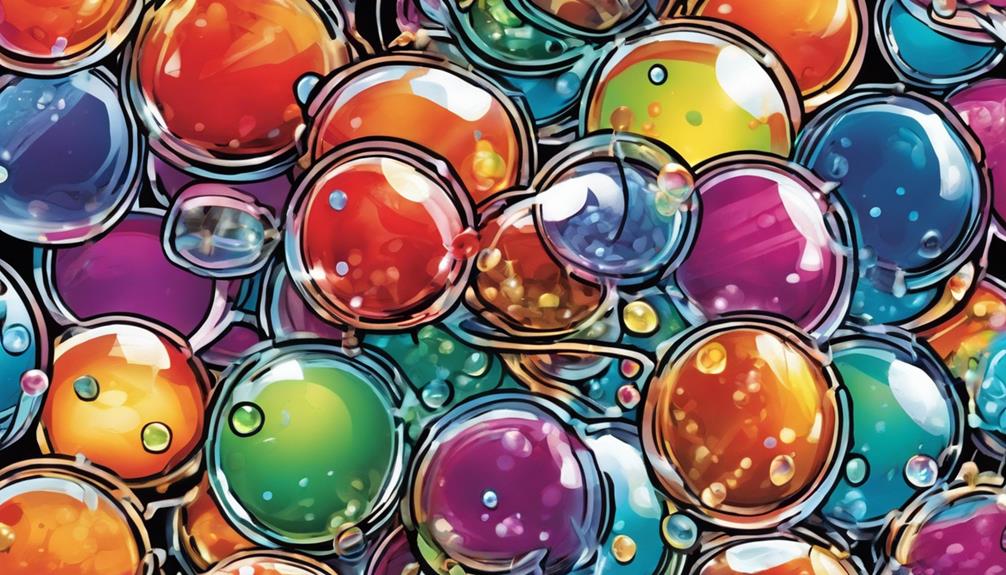
Using effective drinking techniques can greatly protect your teeth from the harmful effects of soda. By implementing a few simple strategies, you can considerably reduce enamel erosion and acid damage.
Consider these four techniques:
- Use a straw: Sipping soda through a straw minimizes direct contact with your teeth, helping to prevent discoloration and reduce acid exposure.
- Drink during meals: Consuming soda alongside food can help neutralize some of the acids produced by the beverage, lowering the risk of enamel erosion.
- Limit intake frequency: Try to restrict soda consumption to just a few times a week, which can lessen the frequency of acid attacks on your teeth.
- Rinse with water: After enjoying soda, rinse your mouth with water to wash away residual sugar and acids, protecting your enamel from prolonged exposure.
Importance of Regular Dental Visits
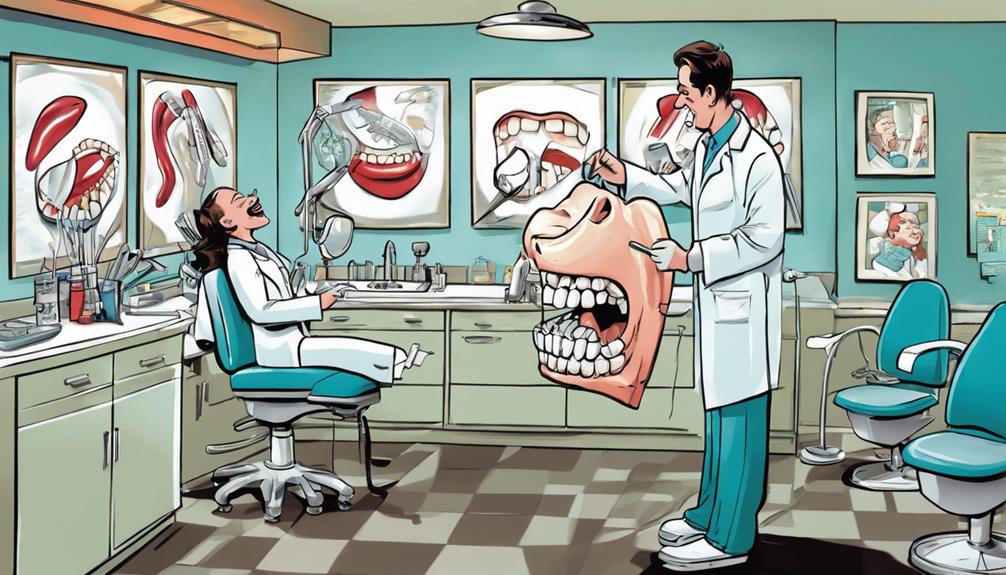
Regular dental visits play an imperative role in safeguarding your teeth, especially if you enjoy soda, as they help monitor the effects of acidic beverages on your oral health. During these regularly scheduled visits, your dentist can identify early signs of tooth decay and erosion caused by soda. This proactive approach allows you to address potential issues before they become severe.
Professional cleanings are a key part of these visits. They help remove plaque and tartar that can build up due to sugary soda intake, greatly reducing your risk of cavities.
Your dentist will also provide personalized advice on managing your soda consumption and its impact on your dental health, ensuring you're informed about the best practices to protect your teeth.
In some cases, dentists may recommend sealants for those who frequently drink soda. This additional protective barrier can help combat enamel erosion and maintain your smile.
Long-Term Effects on Dental Health
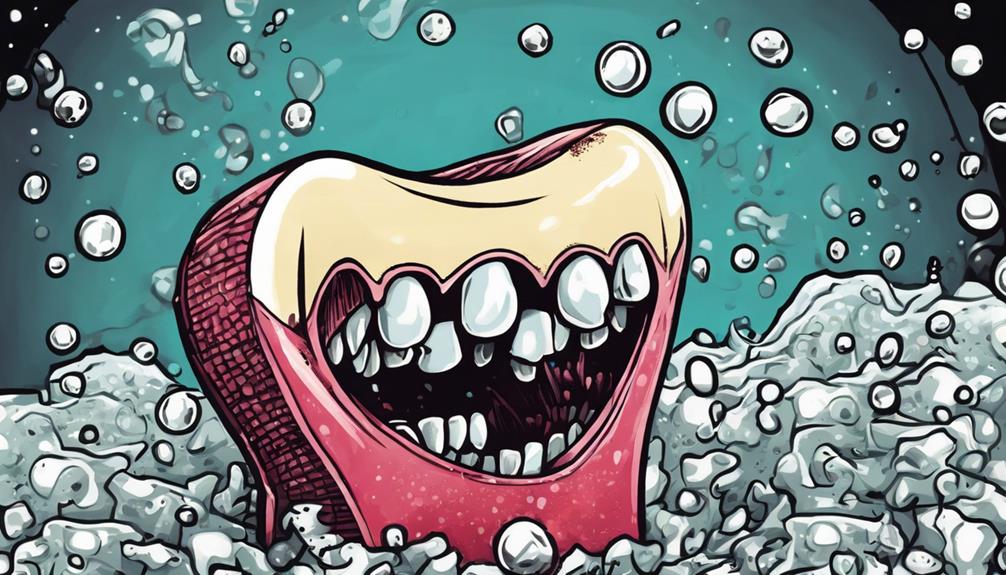
Long-term consumption of soda can severely damage your dental health, leading to issues like tooth erosion and cavities. Here are some alarming effects you should consider:
- Tooth Erosion: The high acidity in soda can wear away your enamel, making your teeth vulnerable to decay.
- Increased Sugar Content: Soda's sugar content feeds harmful bacteria in your mouth, leading to more acid production and worsening tooth decay.
- Cumulative Acid Attacks: Each sip causes acid attacks that can last about 20 minutes, meaning the damage accumulates with every drink.
- Bone Density Risks: Ingredients like phosphoric acid can compromise not just your teeth, but also your jawbone's density, increasing the risk of tooth loss.
These factors combined create a perfect storm for dental problems, making it essential to rethink your soda habit.
The long-term effects on your dental health can snowball, leading to costly treatments and significant discomfort.
Taking Action for Healthier Teeth
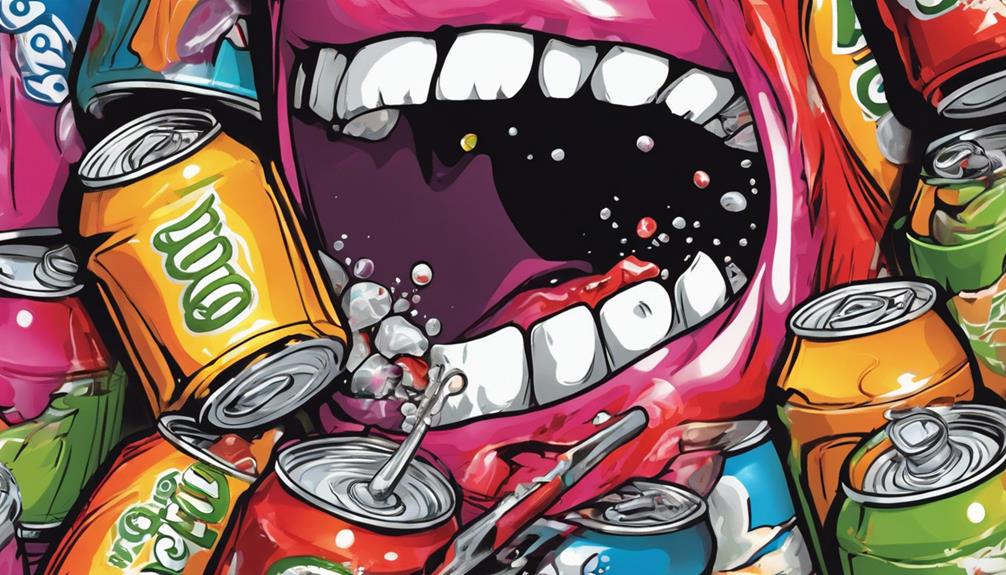
Taking action today to reduce your soda intake can greatly enhance your dental health and protect your smile for the future. By cutting back on soda, you'll notably lower your risk of cavities and tooth erosion caused by the high sugar and acidity in these drinks.
One effective strategy is to drink water after consuming soda; this helps neutralize the acids and sugar that can damage your tooth enamel for up to 20 minutes.
Consider using a straw when you do indulge in soda to minimize direct contact with your teeth. This simple change can reduce exposure to harmful sugars and acids, ultimately protecting your dental health.
Additionally, make regular dental check-ups a priority. Your dentist can provide personalized advice and preventive measures tailored to your unique needs, helping you combat any potential soda-related tooth damage.
Frequently Asked Questions
Why Is Soda Considered Bad for Your Teeth?
Soda's high sugar content feeds bacteria in your mouth, producing harmful acids that attack your tooth enamel. Even diet sodas contain acids that erode enamel, making your teeth more vulnerable to cavities and sensitivity over time.
Will My Teeth Get Better if I Stop Drinking Soda?
Aren't you curious about how your teeth might improve? If you stop drinking soda, you'll likely notice stronger enamel, fewer cavities, and healthier gums. Your overall oral health could really benefit from this positive change!
Why Do Dentists Warn People Against Drinking Soda?
Dentists warn against drinking soda because its high sugar content feeds harmful bacteria, leading to tooth decay. Additionally, the acids in soda attack your enamel, increasing the risk of cavities and long-term dental issues.
Which Soda Decays Teeth the Most?
Cola and dark sodas decay teeth the most due to high sugar and acidity levels. They promote bacterial growth, leading to enamel erosion. Diet sodas also harm, so choose alternatives to protect your dental health.
How Does Skipping Flossing Affect Dental Health in Relation to Drinking Soda?
Many people wonder why flossing is essential for their dental health. Skipping flossing can lead to a buildup of plaque and tartar, which can be exacerbated by drinking soda. The combination of sugary and acidic drinks with poor dental hygiene can result in increased risk of cavities, gum disease, and tooth decay.
Conclusion
So, if you want to keep your smile shining like a knight's armor in the sunlight, it's time to ditch the soda.
The acids and sugars in those fizzy drinks are relentless foes, attacking your enamel and putting your dental health at risk.
By cutting back and adopting healthier habits, you can protect your teeth for the long haul.
Remember, each sip counts, so take action today for a brighter, healthier future!
